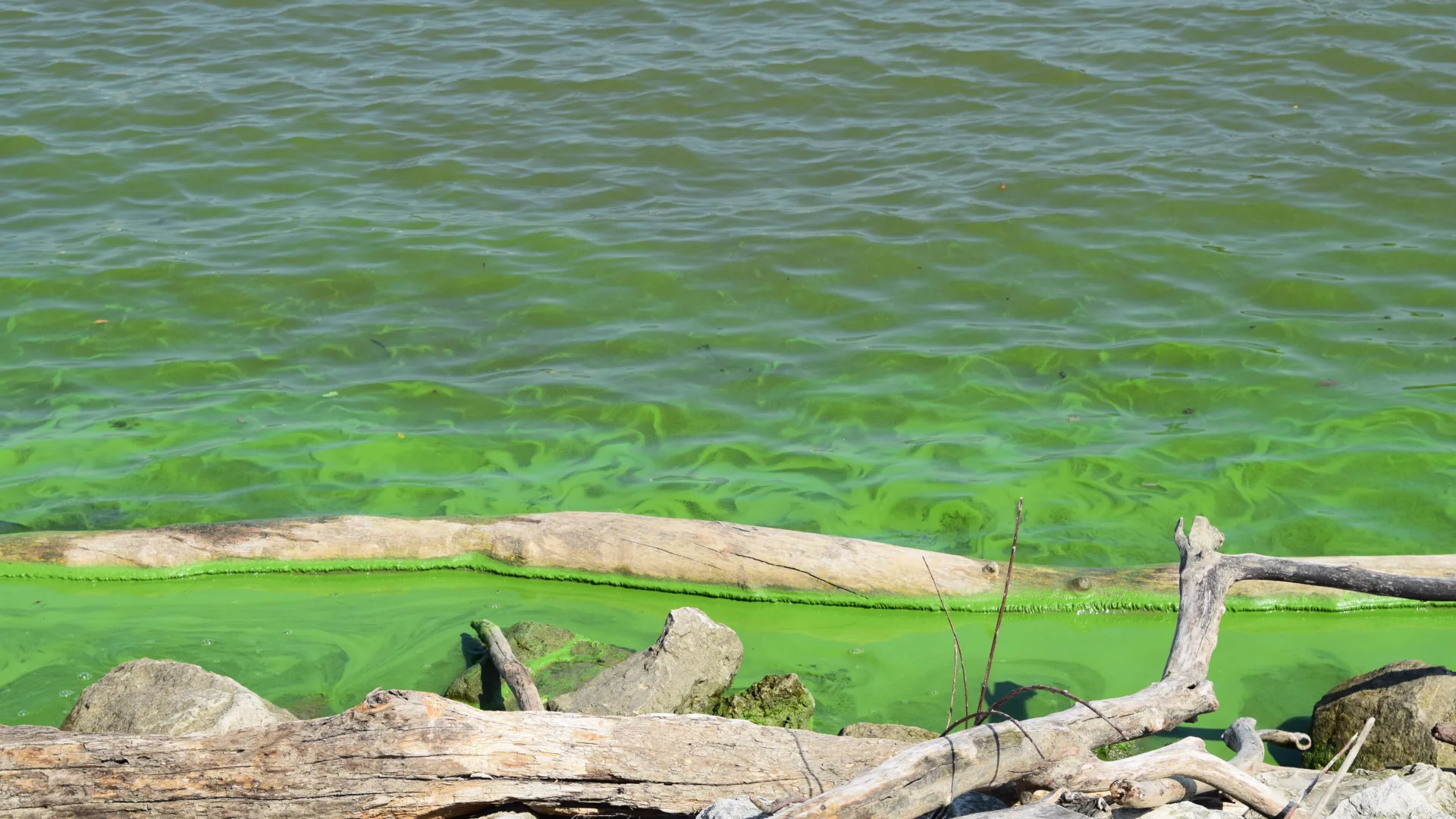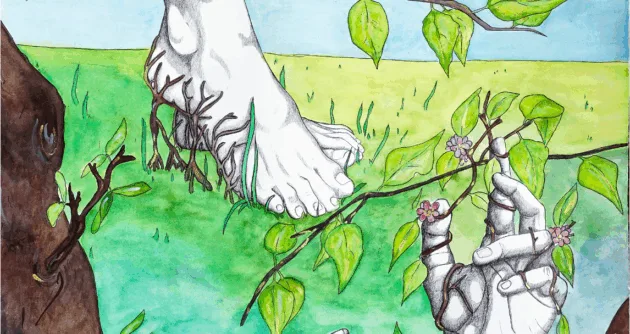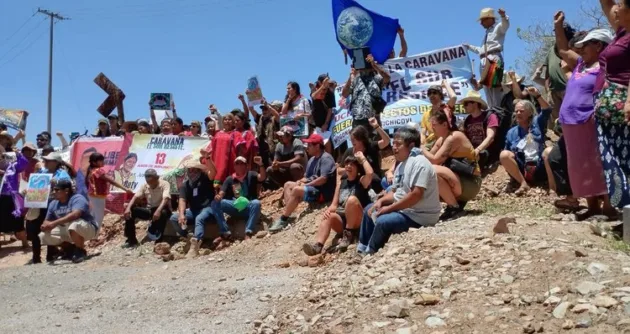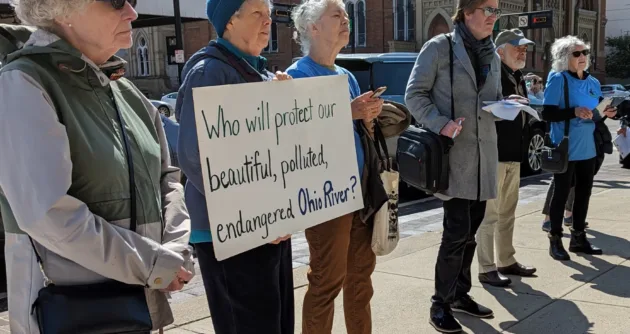Module one: A Community’s voice in the rebellion
Thursday, Sept. 3 at 6:30 pm EST.
For decades Lake Erie has had a reputation as a “dead lake.” It’s time for that to change.
In 2014 nearly 500,000 people lost their water in and around Toledo, Ohio due to a harmful bloom of toxic algae. In 2019, Lake Erie became the first ecosystem in the nation to have it’s right to exist, flourish, and thrive recognized in law – the Lake Erie Bill of Rights (LEBOR). The law has since been stifled by corporate opposition and state preemption, but these actions only reinforce that LEBOR posed a real threat to the status quo.
Join us for this first installment of a three part webinar series. In this segment we will frame a local region’s single issue problem in Northwest Ohio and take a look at how corporate agriculture impacts the water quality of the western Lake Erie Basin and how this in turn affects all the residents of the region. These ecological impacts translate back into the community in the form of water affordability issues, expensive treatment upgrades, health impacts and water shut offs. Finally, we’ll take a look at how Toledoans responded to the water crisis by asserting their right to local self-governance as they drove the Rights of Nature into law.
This is a three part series – please register for each module separately. Below is the registration for our first module.
Module 1: A Community’s Voice in the Rebellion: Impacts on Nature and Community
Thursday, September. 3 at 6:30 pm EST. See the Recording posted below!
Module 2: A Lake’s Voice in the Rebellion: Violating the Rights of Lake Erie
Wednesday, September 9, 2020 at 6:30 pm EST. Watch Here.
Module 3: A Movement’s Voice in the Rebellion: Growing a Rights of Nature Movement
Tuesday, September 29, 2020 at 6:30 pm EST. Watch Here.
Speakers
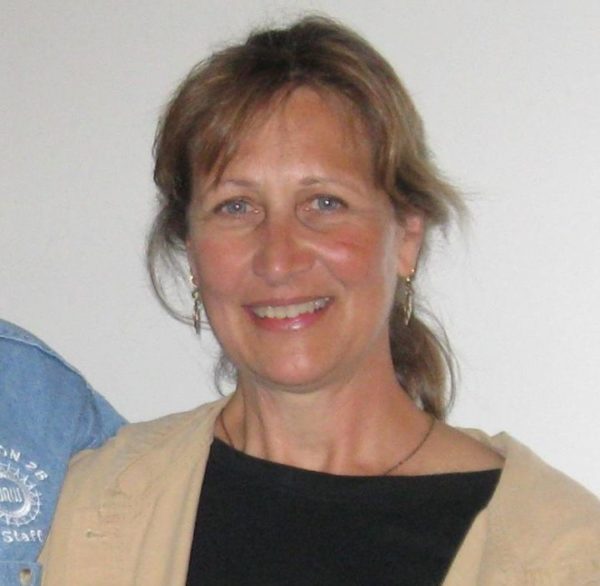 Sherry Fleming lives on a small homestead in rural NW Ohio. Over 20 years ago, Sherry and other members of the community found themselves organizing to protect themselves and the environment from the impacts of factory farms. Since that time, she has worked at the state and local level on issues involving environmental justice, local food networks, water quality, industrial scale agricultural and fracking. Sherry co-founded the local citizen group, the Williams County Alliance. In 2019, the Alliance worked to place a community rights-based citizen initiative on the ballot to prevent privatization of the county’s only source of water, the Michindoh aquifer. Sherry currently serves as chair of the Williams County Alliance, board member for the Ohio Community Rights Network and coordinator for the Bryan Co-op.
Sherry Fleming lives on a small homestead in rural NW Ohio. Over 20 years ago, Sherry and other members of the community found themselves organizing to protect themselves and the environment from the impacts of factory farms. Since that time, she has worked at the state and local level on issues involving environmental justice, local food networks, water quality, industrial scale agricultural and fracking. Sherry co-founded the local citizen group, the Williams County Alliance. In 2019, the Alliance worked to place a community rights-based citizen initiative on the ballot to prevent privatization of the county’s only source of water, the Michindoh aquifer. Sherry currently serves as chair of the Williams County Alliance, board member for the Ohio Community Rights Network and coordinator for the Bryan Co-op.
 Alexis Smith started as a part-time intern for Freshwater Future in June of 2019. She helped launch and test Freshwater Future’s storm-water tracking app, assisted with organizing and managing databases, and engaging Toledo community youth in water education and activities. Prior to her work for Freshwater Future, Alexis worked 18 months in the spine orthopedics industry at Life Spine Inc. as a project engineer intern while completing her undergraduate studies at the University of Toledo. She later graduated with a B.S. in Bioengeering in May 2019. She currently works for Freshwater Future full-time continuing her work with the storm-water app, youth and community engagement, as well as supporting Freshwater Future in all of its technology needs.
Alexis Smith started as a part-time intern for Freshwater Future in June of 2019. She helped launch and test Freshwater Future’s storm-water tracking app, assisted with organizing and managing databases, and engaging Toledo community youth in water education and activities. Prior to her work for Freshwater Future, Alexis worked 18 months in the spine orthopedics industry at Life Spine Inc. as a project engineer intern while completing her undergraduate studies at the University of Toledo. She later graduated with a B.S. in Bioengeering in May 2019. She currently works for Freshwater Future full-time continuing her work with the storm-water app, youth and community engagement, as well as supporting Freshwater Future in all of its technology needs.
 Alicia Smith manages the Great Lakes Network and guides Freshwater Future’s engagement in state and federal policy. In Alicia’s most recent position she served as the Executive Director of Youth Commission and Manager of Youth and Recreation for the City of Toledo. She is the founder of a Toledo, Ohio community organization, Junction Coalition, that started as an opportunity to help the community help themselves through partnering with others to address social, economic, and environmental issues and improve the community’s quality of life. Alicia’s doctoral studies at the University of Toledo focus on the educational development of youth of color within low socioeconomic and disenfranchised communities. She acquired a Bachelor of Arts in education and counseling, as well as a Master of Arts in criminal justice and juvenile law from the University of Toledo.
Alicia Smith manages the Great Lakes Network and guides Freshwater Future’s engagement in state and federal policy. In Alicia’s most recent position she served as the Executive Director of Youth Commission and Manager of Youth and Recreation for the City of Toledo. She is the founder of a Toledo, Ohio community organization, Junction Coalition, that started as an opportunity to help the community help themselves through partnering with others to address social, economic, and environmental issues and improve the community’s quality of life. Alicia’s doctoral studies at the University of Toledo focus on the educational development of youth of color within low socioeconomic and disenfranchised communities. She acquired a Bachelor of Arts in education and counseling, as well as a Master of Arts in criminal justice and juvenile law from the University of Toledo.
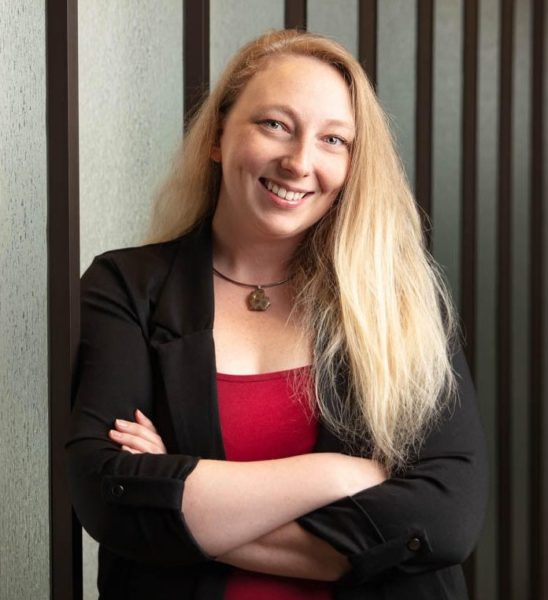 Markie Miller is a member of the CELDF communication team. In 2014, nearly 500,000 people in and around her community of Toledo, Ohio lost access to clean and safe drinking water for three days due to a toxic algal bloom in the Western Basin of Lake Erie. This crisis was the catalyst for her work and passion for the Rights of Nature and Community Rights Movements. She quickly became a lead organizer and spokesperson for Toledoans for Safe Water – a grassroots citizens group in Toledo. She played a crucial role in drafting, petitioning, and eventually passing the Lake Erie Bill of Rights – a local law recognizing the legal right of Lake Erie to exist, flourish and thrive. Markie is a volunteer board member of the Ohio and National Community Rights Networks – working to advance the right to local self-governance and the rights of nature at the state and federal level.
Markie Miller is a member of the CELDF communication team. In 2014, nearly 500,000 people in and around her community of Toledo, Ohio lost access to clean and safe drinking water for three days due to a toxic algal bloom in the Western Basin of Lake Erie. This crisis was the catalyst for her work and passion for the Rights of Nature and Community Rights Movements. She quickly became a lead organizer and spokesperson for Toledoans for Safe Water – a grassroots citizens group in Toledo. She played a crucial role in drafting, petitioning, and eventually passing the Lake Erie Bill of Rights – a local law recognizing the legal right of Lake Erie to exist, flourish and thrive. Markie is a volunteer board member of the Ohio and National Community Rights Networks – working to advance the right to local self-governance and the rights of nature at the state and federal level.
Module one: A Community’s voice in the rebellion
Thursday, Sept. 3 at 6:30 pm EST.
For decades Lake Erie has had a reputation as a “dead lake.” It’s time for that to change.
In 2014 nearly 500,000 people lost their water in and around Toledo, Ohio due to a harmful bloom of toxic algae. In 2019, Lake Erie became the first ecosystem in the nation to have it’s right to exist, flourish, and thrive recognized in law – the Lake Erie Bill of Rights (LEBOR). The law has since been stifled by corporate opposition and state preemption, but these actions only reinforce that LEBOR posed a real threat to the status quo.
Join us for this first installment of a three part webinar series. In this segment we will frame a local region’s single issue problem in Northwest Ohio and take a look at how corporate agriculture impacts the water quality of the western Lake Erie Basin and how this in turn affects all the residents of the region. These ecological impacts translate back into the community in the form of water affordability issues, expensive treatment upgrades, health impacts and water shut offs. Finally, we’ll take a look at how Toledoans responded to the water crisis by asserting their right to local self-governance as they drove the Rights of Nature into law.
This is a three part series – please register for each module separately. Below is the registration for our first module.
Module 1: A Community’s Voice in the Rebellion: Impacts on Nature and Community
Thursday, September. 3 at 6:30 pm EST. See the Recording posted below!
Module 2: A Lake’s Voice in the Rebellion: Violating the Rights of Lake Erie
Wednesday, September 9, 2020 at 6:30 pm EST. Watch Here.
Module 3: A Movement’s Voice in the Rebellion: Growing a Rights of Nature Movement
Tuesday, September 29, 2020 at 6:30 pm EST. Watch Here.
Speakers
 Sherry Fleming lives on a small homestead in rural NW Ohio. Over 20 years ago, Sherry and other members of the community found themselves organizing to protect themselves and the environment from the impacts of factory farms. Since that time, she has worked at the state and local level on issues involving environmental justice, local food networks, water quality, industrial scale agricultural and fracking. Sherry co-founded the local citizen group, the Williams County Alliance. In 2019, the Alliance worked to place a community rights-based citizen initiative on the ballot to prevent privatization of the county’s only source of water, the Michindoh aquifer. Sherry currently serves as chair of the Williams County Alliance, board member for the Ohio Community Rights Network and coordinator for the Bryan Co-op.
Sherry Fleming lives on a small homestead in rural NW Ohio. Over 20 years ago, Sherry and other members of the community found themselves organizing to protect themselves and the environment from the impacts of factory farms. Since that time, she has worked at the state and local level on issues involving environmental justice, local food networks, water quality, industrial scale agricultural and fracking. Sherry co-founded the local citizen group, the Williams County Alliance. In 2019, the Alliance worked to place a community rights-based citizen initiative on the ballot to prevent privatization of the county’s only source of water, the Michindoh aquifer. Sherry currently serves as chair of the Williams County Alliance, board member for the Ohio Community Rights Network and coordinator for the Bryan Co-op.
 Alexis Smith started as a part-time intern for Freshwater Future in June of 2019. She helped launch and test Freshwater Future’s storm-water tracking app, assisted with organizing and managing databases, and engaging Toledo community youth in water education and activities. Prior to her work for Freshwater Future, Alexis worked 18 months in the spine orthopedics industry at Life Spine Inc. as a project engineer intern while completing her undergraduate studies at the University of Toledo. She later graduated with a B.S. in Bioengeering in May 2019. She currently works for Freshwater Future full-time continuing her work with the storm-water app, youth and community engagement, as well as supporting Freshwater Future in all of its technology needs.
Alexis Smith started as a part-time intern for Freshwater Future in June of 2019. She helped launch and test Freshwater Future’s storm-water tracking app, assisted with organizing and managing databases, and engaging Toledo community youth in water education and activities. Prior to her work for Freshwater Future, Alexis worked 18 months in the spine orthopedics industry at Life Spine Inc. as a project engineer intern while completing her undergraduate studies at the University of Toledo. She later graduated with a B.S. in Bioengeering in May 2019. She currently works for Freshwater Future full-time continuing her work with the storm-water app, youth and community engagement, as well as supporting Freshwater Future in all of its technology needs.
 Alicia Smith manages the Great Lakes Network and guides Freshwater Future’s engagement in state and federal policy. In Alicia’s most recent position she served as the Executive Director of Youth Commission and Manager of Youth and Recreation for the City of Toledo. She is the founder of a Toledo, Ohio community organization, Junction Coalition, that started as an opportunity to help the community help themselves through partnering with others to address social, economic, and environmental issues and improve the community’s quality of life. Alicia’s doctoral studies at the University of Toledo focus on the educational development of youth of color within low socioeconomic and disenfranchised communities. She acquired a Bachelor of Arts in education and counseling, as well as a Master of Arts in criminal justice and juvenile law from the University of Toledo.
Alicia Smith manages the Great Lakes Network and guides Freshwater Future’s engagement in state and federal policy. In Alicia’s most recent position she served as the Executive Director of Youth Commission and Manager of Youth and Recreation for the City of Toledo. She is the founder of a Toledo, Ohio community organization, Junction Coalition, that started as an opportunity to help the community help themselves through partnering with others to address social, economic, and environmental issues and improve the community’s quality of life. Alicia’s doctoral studies at the University of Toledo focus on the educational development of youth of color within low socioeconomic and disenfranchised communities. She acquired a Bachelor of Arts in education and counseling, as well as a Master of Arts in criminal justice and juvenile law from the University of Toledo.
 Markie Miller is a member of the CELDF communication team. In 2014, nearly 500,000 people in and around her community of Toledo, Ohio lost access to clean and safe drinking water for three days due to a toxic algal bloom in the Western Basin of Lake Erie. This crisis was the catalyst for her work and passion for the Rights of Nature and Community Rights Movements. She quickly became a lead organizer and spokesperson for Toledoans for Safe Water – a grassroots citizens group in Toledo. She played a crucial role in drafting, petitioning, and eventually passing the Lake Erie Bill of Rights – a local law recognizing the legal right of Lake Erie to exist, flourish and thrive. Markie is a volunteer board member of the Ohio and National Community Rights Networks – working to advance the right to local self-governance and the rights of nature at the state and federal level.
Markie Miller is a member of the CELDF communication team. In 2014, nearly 500,000 people in and around her community of Toledo, Ohio lost access to clean and safe drinking water for three days due to a toxic algal bloom in the Western Basin of Lake Erie. This crisis was the catalyst for her work and passion for the Rights of Nature and Community Rights Movements. She quickly became a lead organizer and spokesperson for Toledoans for Safe Water – a grassroots citizens group in Toledo. She played a crucial role in drafting, petitioning, and eventually passing the Lake Erie Bill of Rights – a local law recognizing the legal right of Lake Erie to exist, flourish and thrive. Markie is a volunteer board member of the Ohio and National Community Rights Networks – working to advance the right to local self-governance and the rights of nature at the state and federal level.
